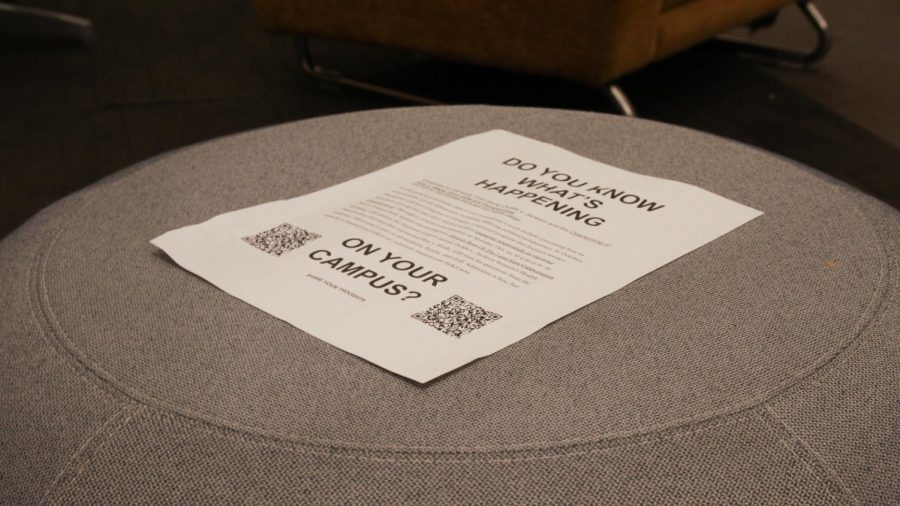Students respond to upcoming Congress to Campus event
October 6, 2022
On Thursday, Sept. 22, Macalester College announced that former Congresspeople Sam Coppersmith (D-Ariz.) and Dennis Ross (R-Fla.) will visit campus to discuss reproductive rights as part of the Congress to Campus program. This announcement has been met with outrage from many students.
The Congress to Campus event will unfold in various locations across campus on Monday, Oct. 10. The former representatives will visit classes and publicly discuss reproductive rights at 4:45 P.M. in the Mairs Concert Hall, among other activities. Attendees do not have to pay for admission but must register in advance due to capacity limits.
Former representatives Coppersmith and Ross will be discussing the Dobbs v. Jackson Women’s Health Organization decision, which effectively overturned Roe v. Wade. The event is advertised as an opportunity to “communicate across differences, including differing political perspectives” in the Mac Daily. Many students do not believe this will be effective.
Bea Green ’22, who voiced concerns surrounding the program, shared her opinion with The Mac Weekly.
“Saying that [the former representatives] are going to ‘engage respectfully in vigorous disagreement,’ which was the language used in the blurb, about an issue as fundamental as human rights that deeply impacts people’s health, people’s lives even, is disrespectful,” Green said. “And people in the audience are not learning how to communicate across difference.”
Green’s involvement with Congress to Campus doesn’t end with her individual disapproval of the event. Green collaborated with Elise Sexton ’23 to schedule a discussion on Friday, Sept. 30 with the organizers of the event, Political Science Professor Andrew Latham, American Studies Professor Duchess Harris and Macalester Forensics Director Beau Larsen. Larsen will oversee which questions the forensics team will ask Coppersmith and Ross during their discussion.
Sexton, Green and several other students prepared for this discussion by circulating an anonymous survey asking for community opinions about Congress to Campus. The group of students also met with Dr. Alina Wong, Vice President for Diversity, Equity and Inclusion, and Dr. Kathryn Kay Coquemont, Associate Vice President for Student Affairs and Dean of Students, for separate support.
In the meeting with Harris, Latham and Larsen, Sexton and Green read multiple responses to their survey. Although not all responses were read in the meeting, the survey received both positive and negative responses towards the Congress to Campus event.
“I think it’s interesting and I’m glad it is happening,” one anonymous response read. “The truth is that while rights shouldn’t be debatable, they are being debated. That’s a hard truth. We can’t just pretend that it’s not happening. Deplatforming the event doesn’t actually change anything.”
“Reproductive rights aren’t up for debate,” another response detailed. “This event makes the dramatic loss of reproductive rights a purely academic conversation. It is not. Everyone has the right to bodily autonomy. Period.”
The discussion also brought up the potential harms of the event timing. Many critics feel that it is inappropriate to hold Congress to Campus on Indigenous People’s Day, as issues of reproductive justice disproportionately impact Indigenous communities.
“I think in retrospect now, we wouldn’t have chosen this date,” Latham told The Mac Weekly. “I didn’t realize it was Indigenous Persons’ [sic] Day, and there’s a lot of stuff going on across campus.”
Although Harris and Latham chose the date for Congress to Campus, they did not choose former representatives Coppersmith and Ross as speakers. The representatives were chosen by Former Members of Congress, the organization that founded Congress to Campus.
In the update that Harris and Latham shared through the Mac Daily on Sept. 30, they responded to criticism about demographics of the former representatives: “We’ve heard concerns that both former members of Congress coming to campus are cisgender white men. Because the program only works with former members of Congress, the reality is that there are few female former members of Congress of any race, and few former members of Congress who identify as people of color.”
“That’s a reason why the people coming to campus ended up being two men,” Sexton said in response. “That’s not an excuse for picking a highly controversial topic that deals with an issue that affects a lot of women and amplifying the exact voices that we shouldn’t be hearing on the issue.”
Throughout the meeting between students and faculty, students brought up the future of Congress to Campus at Macalester. The contract that President Suzanne Rivera signed with Former Members of Congress assures Congress to Campus programming on campus for the next five years; the $2,000 commitment per year was donated by an alum. In future years, event organizers will have jurisdiction over what topics are discussed but not which former representatives visit campus.
This year, students did not have input in deciding the topic of the Congress to Campus programming. Members of the forensics team created questions to ask the former representatives, and Harris and Latham are planning on creating more opportunities for student input in the future. Harris shared that she is interested in working in collaboration with both students and outside organizations in the future.
“It was saddening on Friday, to not just see the hurt in the room but to feel it,” Harris said. “And we are both committed to [asking], ‘How does the campus move forward in this particular moment? And how do we live in this moment? And how do we collaborate with local organizations and national organizations to respond?’”
In her op-ed in The Mac Weekly with Latham, “Why Congress to Campus Should be Held,” the duo additionally suggests that individuals can take action by “direct[ing their] righteous discontent to an organization like Family Tree Clinic, Gender Justice, UnRestrict Minnesota, Our Justice or SPIRAL Collective.”
For Green and Sexton, future actions include distributing a “Call to Partnership” throughout the student body. This document will focus on what they believe was mishandled in organizing this year’s Congress to Campus programming and how the campus community can effectively move forward. In addition to this “Call to Partnership,” Green and Sexton plan on protesting outside the Mairs Concert Hall during the event.
“I do think that communicating across differences, which is the stated goal of this event, is incredibly important,” Green said. “And it’s an incredibly important skill for Macalester students to learn and experience. But I feel that this event is not effective towards achieving that goal.”














